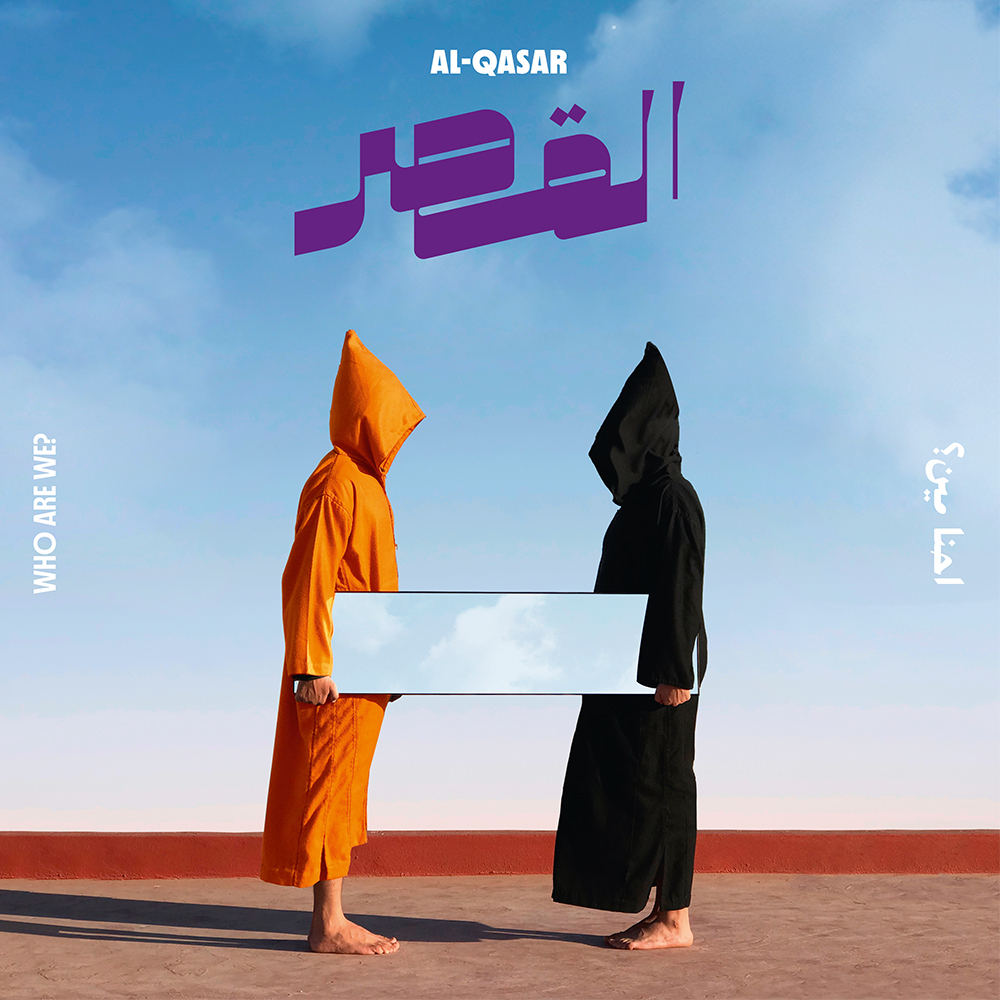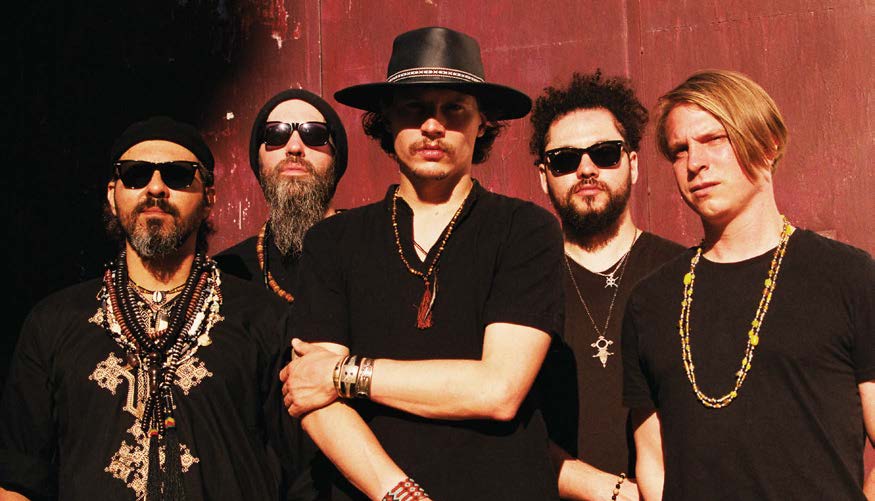Glitterbeat bringen Mitte des Monats das Album “Who Are We?” der international besetzten und im Kern arabischen Psych Rock-Combo Al-Qasar heraus. Unter Einsatz von Instrumenten wie u.a. Saz, Bendir, Daf, Gitarren, Bongos, Rasseln, E-Bass und verschiedensprachiger Vocals entstand eine kraftvolle, z.T. enorm tanzbare Musik, die von den Musikern selbst Arabian Fuzz genannt wird. Zwei Überraschungsgäste, die die Band um den Instrumentalisten Thomas Attar Bellier mit Gesang und Gitarren begleiten sind der ehemalige Dead Kennedys-Frontmann Jello Biafra und Lee Ranaldovon Sonic Youth, weitere Gäste am Mikro sind – an einem der Höhepunkte des Albums – die aus dem Sudan stammende New Yorker Sängerin Alsarah, Speed Caravan-Vokalist Mehdi Haddab und die ägyprische Sängerin Hend Elrawy. Das Album erscheint als LP, CD und Download.
When continents collide, they make a thunderous sound. Al-Qasar create the soundtrack to that fission on their full-length debut, Who Are We? It is music for a world in flux, with its ancestors deep in the past, but something that could only have been born in the 21st century. Arabian fuzz, they term it, a vision that’s brazenly electric and deeply connected to its roots. But it had a definite starting point. “Al-Qasar was born in the Barbès neighbourhood of Paris,” explains band leader Thomas Attar Bellier. “I’ve lived in Los Angeles, Paris, New York, Lisbon… I wanted to start a project that was in tune with the daily life of people living in these international cities, something diverse, radically colourful, with a fresh, contemporary outlook on what societies really look like today”. The musicians came together, from France, Morocco, Algeria, Egypt, and the United States. Shows followed, first in France, then in Europe and the Middle East. They put out an EP, the widely-lauded Miraj, recorded in Cairo. In the same time frame, Attar Bellier collaborated with the likes of Emel Mathlouthi and Dina El Wedidi, two of the most exciting names in contemporary Arab music.
Work on Who Are We? began in December 2020, with Attar Bellier composing eight tracks that writhe and roar in skilfully controlled chaos. Bass, drums and traditional percussion create a deep, irresistible groove for the foundation, while electric saz and guitars build a wailing wall above, with Moroccan vocalist Jaouad El Garouge’s ecstatic voice, steeped in his Gnawa upbringing, pulling inspiration from history as it strides into the future. Drawing on years of experience working in Los Angeles studios, Attar Bellier produced the album. Who Are We? translates the sound that inhabited his head into something physical that stirs spirit, heart and feet. It is relentless and insistent, like a psychedelic celebration on the dancefloor, bristling with the kind of deep energy that makes Al-Qasar sound like the world’s most dangerous wedding band. During those years spent behind the control board, Attar Bellier made some good friends in the US, and they’ve been eager to help out on the project. Alain Johannes (Queens of the Stone Age, PJ Harvey) mixed the record, and Grammy-winner Dave Collins mastered it. The Dead Kennedys’ Jello Biafra was a natural addition to “Ya Malak,” his inimitable voice reciting a translation of Egyptian revolutionary poet Ahmed Fouad Negm, elevating the record’s social critique while showcasing the first-ever English recording of Negm’s work.
Jello Biafra is not the only punk hero to appear on Who Are We? Lee Ranaldo of Sonic Youth layers textured, brooding guitar over the first two cuts, “Awtar Al Sharq” and “Awal.” The sweeping drones embrace the Moroccan bendir groove to magical results. “Lee sent me upwards of eighteen guitar tracks,” says Attar Bellier in amazement. “It was enough for an entire EP, and all so good. The hard part was deciding what not to use. Lee’s vibe just fit perfectly with what I was trying to do with the track.” Al-Qasar’s magnetic pull drew big names from other continents, too. Hend Elrawy, the acclaimed Egyptian singer whom the band met in Cairo, brings her powerful voice to “Mal Wa Jamal”, whose Arabic lyrics promote a female-centric and humbling outlook on prostitution and its consequences. Like the other songs on the album, its social consciousness is carefully veiled in images. “Hobek Tawrat,” for instance, can be taken as a love song, with its seductive, ringing opening on the electric saz that leads up to the aching voice of New York-based Sudanese innovator Alsarah (Alsarah & The Nubatones). On the surface it offers the gliding, breathless sensuality of romance. Underneath, though, its heart is spikily political as Alsarah calls out against the coup in her homeland, rising in passion with each verse – the chorus a slogan from the recent demonstrations.
One of the band’s great coups is the track “Barbès Barbès,” an ode and homage to the neighbourhood in Paris where Al-Qasar first came together. The iconic Mehdi Haddab (Speed Caravan) added his oud virtuosity to the track. “Barbès is this edgy, amazing, historically Algerian, and still ungentrified part of the city” explains Attar Bellier. “To me, it is more typical of the way Paris really is than the Eiffel Tower, or than the Louvre. Real people live there, real culture happens there.” Haddab, who occasionally performs with the band, is famous for introducing the oud as a rock’n’roll instrument. “When he played on the track, it was as if he’d set it alight, it just came to life.” Who Are We? is a deep, exhilarating album. Its intensity never wavers, music that pulls from the hypnotic roots of North African trance and threads it into a fabric with the elaborate beauty of Arabic scales and the shock and thrill of rock’n’roll. It is modern folklore, a reflection of the cross-cultural society we’ve become. The continents have collided, and the result is deep magic. Who Are We? Al-Qasar ask. The answer is there on the album cover. Look in the mirror. We are you and me. We are then. We are here. We are now. And we are tomorrow. Listen.
Foto: Kid Richards

